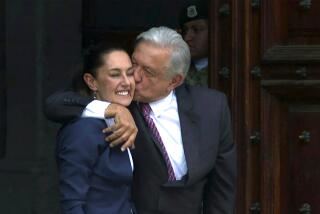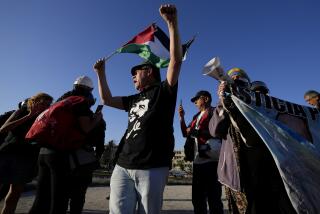Nicaragua’s Opposition Parties Critical as Sandinistas Push for New Constitution
- Share via
MANAGUA, Nicaragua — By some accounts, the controversial constitution being drafted in the Sandinista-dominated National Assembly will be Nicaragua’s 17th, including four that were written but never put into effect.
Many of the constitutions were abolished, altered or simply ignored, as in 1856, when the American adventurer William Walker declared himself president of Nicaragua with no regard at all for the constitution of 1838.
“As long as there is a war and a state of emergency law, this constitution has no possibility of entering into force,” said Virgilio Godoy, leader of the Liberal Independent Party. “It might as well be locked up in a safe and preserved for the next century.”
A year ago, the government announced a state of emergency law, suspending the right of free speech, the right of free assembly and the right to form unions and to strike, all of which are included in the proposed constitution. The Sandinistas said the law was necessary to counter the Washington-backed Nicaraguan insurgents, the so-called contras, who are trying to bring down the government.
Conservative and leftist opposition leaders are threatening to refuse to sign the constitution, which is being approved article by article in the National Assembly, where the Sandinistas have a majority.
While the few far-left assemblymen clamor that the draft is too “bourgeois,” the centrists and conservatives contend that it gives too much power to the president, who could be reelected to an unlimited number of terms, and that it ties the national army to the governing party, the Sandinista National Liberation Front, by calling it the Sandinista People’s Army.
“This would be the establishment of a constitutional dictatorship,” said Godoy, whose Liberal Party has been split during the debate by Sandinista political maneuvers.
Manuel Diaz, leader of the Popular Social Christian Party, said: “We cannot accept that the Sandinista party has an armed branch. That would be committing political hara-kiri and would close the door to political development in the country.”
The Sandinistas appear to be determined to hold fast to the article that names the army after Augusto Cesar Sandino, the martyred revolutionary who fought against U.S. Marines in Nicaragua in the 1920s and 1930s.
The 198-article draft constitution was written by a Sandinista-led committee of the assembly that held more than 70 town meetings throughout the country to consult with the public. The assembly is expected to complete its work on the constitution by next month, and the document would become law in January.
Rafael Solis, Sandinista secretary of the National Assembly, said it has not been decided whether there will be a public referendum on the constitution.
Opposition assemblymen say they have been able to make little in the way of a substantive contribution to the nearly 30 articles approved so far, except that they were able to persuade the Sandinista majority to eliminate a provision that would have allowed the president to revoke the citizenship of any Nicaraguan for treason--a measure clearly aimed at the contras, who are based in neighboring Honduras and in Miami.
Like many constitutions in Latin America, this one gives far more power to the presidency than to the legislature or the courts. It would allow the president to declare war without the approval of the National Assembly, to draw up the national budget in time of war, to declare a state of emergency and to name the mayor of Managua as well as the members of the Cabinet and the Supreme Court. The president would be elected for a six-year term.
The proposed constitution guarantees equal rights for men and women and prohibits discrimination on the basis of race, color, religion, political creed or “social condition.” It guarantees equal pay for equal work, paid leaves of absence during pregnancy, the right to food, shelter, education, health care and a job, and it prohibits torture and capital punishment.
The document would commit Nicaragua to the principles of democracy, political pluralism, a mixed economy and international nonalignment, but opponents contend that the terms are not adequately defined.
“It leaves too large a margin for legislative interpretation,” Godoy said.
Diaz said: “The constitution should define for us what kind of revolution this is, what kind of political regime, what kind of economy we are going to have. As it is, we are not satisfied that it does this.”
The draft would recognize the right of private property but says that the state is responsible for the direction and planning of the economy. It guarantees workers the right to participate in the economic planning of companies as well as the country, promises agrarian reform to achieve “the just distribution of land” and outlaws ownership of large, unused landholdings.
The small Marxist-Leninist Popular Action Movement argues that the constitution does not go far enough toward ensuring political control by the working classes.
The conservative and centrist opposition, on the other hand, complains that although the Sandinista National Liberation Front (FSLN) is mentioned only in the preamble, the draft document does not ensure a separation of the Sandinista party from the state and the army.
“We do not even want the FSLN party flag in public buildings,” said Eduardo Molina, a leader of the Democratic Conservative Party.
Molina wants God, rather than the Sandinistas, mentioned in the preamble. His party lost a battle to have abortion banned by the constitution, although abortion is now illegal in Nicaragua.
The Sandinistas hold 61 of the 96 seats in the assembly. The Conservative Party, divided into several factions, has 14 seats. The Liberal Party holds nine seats and the Popular Social Christian Party six seats. The rest are divided among three Marxist-Leninist parties.
The Sandinistas have agreed to an opposition demand for a national dialogue over such central issues as democracy and political pluralism, but the other parties had wanted the dialogue to take place before the constitutional debate. The other parties, which generally oppose “a military solution,” as they refer to the contras war, are trying to pressure the Sandinistas into relinquishing some of their political power and to allow “true democracy” in Nicaragua.
Until the opposition parties are satisfied that the constitution guarantees Western-style democracy and political pluralism, the Sandinistas face the possibility that they may be the sole signers of the new constitution.
“Our parliamentary strategy is to confront the issues article by article and permanently denounce them (the Sandinistas) for giving us a political constitution,” Molina said. “We are not going to sign a constitution like this.”
A member of Molina’s party who has lived through four other constitutions added: “They all say nice things, but they are never respected. The value of a good constitution is in the practice.”
More to Read
Sign up for Essential California
The most important California stories and recommendations in your inbox every morning.
You may occasionally receive promotional content from the Los Angeles Times.












